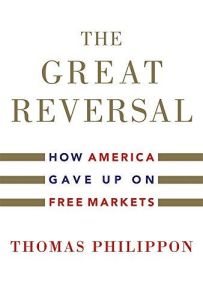Join getAbstract to access the summary!

Join getAbstract to access the summary!
Thomas Philippon
The Great Reversal
How America Gave Up on Free Markets
Belknap Press, 2019
What's inside?
The US economy used to be competitive and one of the best for consumers. Not anymore.
Recommendation
One stereotype associated with the United States is that it’s the land of free markets and competition, where entrepreneurialism, deal making and hard work benefit consumers. But according to professor Thomas Philippon in this critical assessment of the American economy, that’s no longer true. He points to big mergers, effective lobbying and a lack of new entrants as quietly but steadily increasing company profits while harming consumers. Readers will appreciate that Philippon challenges preconceptions and defies partisan pigeon-holing in describing America’s new take on competition.
Summary
About the Author
Thomas Philippon, a finance professor at New York University, sits on the Monetary Policy Advisory Panel of the New York Federal Reserve Bank.
















Comment on this summary